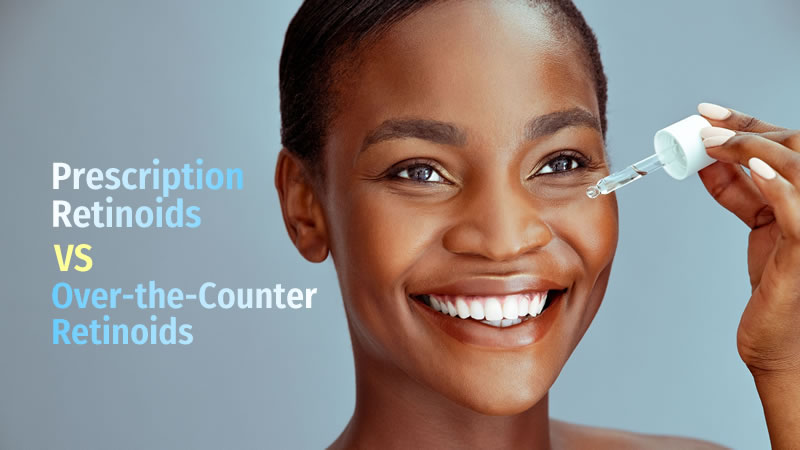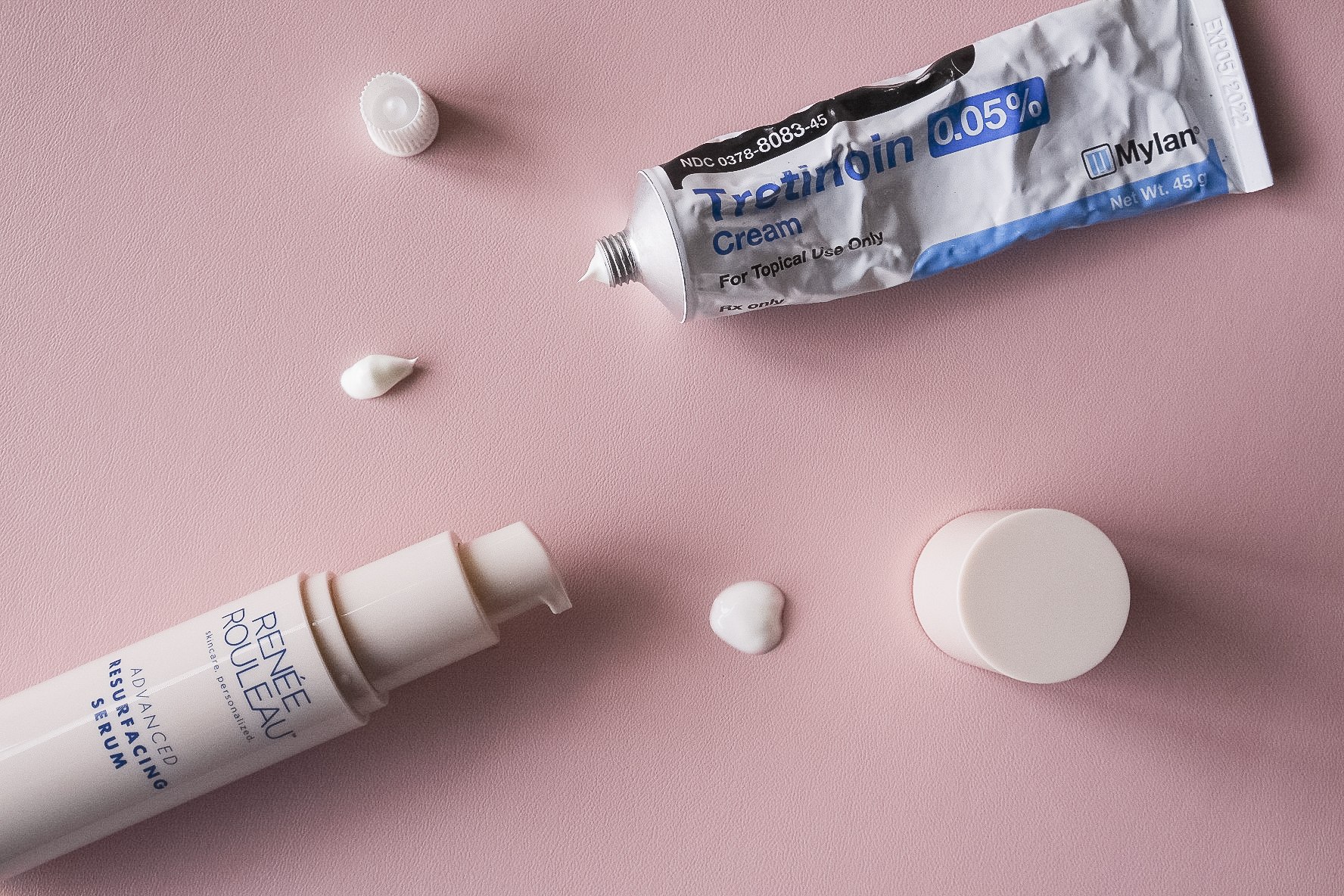Prescription retinoids are widely used acne medications, while retinol is a component found in several skincare products; both belong to the retinoid family. Prescription retinoids act directly on the skin, while retinol is absorbed and exerts its effects post-metabolism.
Identifying the appropriate skin care treatment might be daunting due to the plethora of accessible alternatives. It is advisable to see a Felix healthcare practitioner for information on the most suitable options for you.
A multitude of skincare products exist that assert the ability to diminish fine lines and wrinkles, enhance collagen production, address acne, and improve overall skin texture. Many of them are effective. This is due to the presence of an active component known as retinoids.
However, not all retinoids are the same. Various retinoids exist, including retinol and prescription retinoids. Retinol and prescription retinoids are among the most prevalent active constituents in skincare formulations. Understanding the capabilities and limitations of each product can assist you in selecting the appropriate skincare item for your needs.

What are retinoids?
Retinoids are often mentioned in beauty advertisements and publications, but what are they precisely? “Retinoid” refers to a category of chemicals that are synthesized from vitamin A. This encompasses both retinol and prescription retinoids.
Retinoids are a preferred component in several cosmetic products and topical skincare treatments for valid reasons. Retinoids have potent anti-aging properties [1] and may enhance the texture and appearance of the skin. When used consistently, they may enhance skin firmness and smoothness, as well as illuminate your complexion.
Retinoids enhance the rate of cellular turnover [2], hence facilitating the unclogging of pores. This is why some retinoids are used for acne therapy.
However, not all retinoids are the same. Retinol and prescription retinoids, two of the most prevalent retinoids, are both efficacious, however, used as distinct skincare treatments.
What distinguishes prescription retinoids from retinol?
Prescription retinoids and retinol both originate from vitamin A; yet, they exhibit substantial distinctions and applications.
Retinoid prescription
Prescription retinoid is a drug prescribed for the treatment of sun-damaged and acne-prone skin. It is available in gel or cream formulation for topical use. Prescription retinoids are marketed under many brand names, either as a standalone substance or in conjunction with other non-pharmaceutical components.
Prescription retinoids are effective for addressing fine wrinkles and hyperpigmentation resulting from extended sun exposure. Consequently, it may enhance skin texture and is often recommended for hyperpigmentation, functioning as a moderate skin lightening agent that addresses dark spots. Although it has acidic properties and functions as an exfoliator, it may enhance surface wrinkles, although it is ineffective for deep wrinkles. Tretinoin is a widely used drug for acne treatment.
Similar to several other acid-based topical treatments and creams, prescription retinoids promote cell development by first irritating the skin. Although it may seem paradoxical, it effectively accelerates the skin’s natural cell development process via irritation. This accelerates cellular turnover, exposing a rejuvenated and healthy epidermal layer.
Recommended article
Methods that are both healthy and visible for weight loss while breastfeeding
Potential adverse effects
Like other drugs, prescription retinoids are not suitable for everyone. Potential adverse consequences may encompass: [3]
- Transient warmth, burning, tingling, or a stinging feeling upon application (which should subside).
- Desquamation, scaling, and/or pronounced xerosis
- Skin discoloration or transient hyperpigmentation
- Dermatological rash and/or erythema
- Exacerbation of acne, especially during the first two to four weeks of use
- Heightened susceptibility to solar radiation
Your physician will inform you that photosensitivity exists and that exposure to sunlight should be limited when using prescription retinoids. Consistently ensure the use of SPF sunscreen, regardless of the winter season. It may also be unsuitable for those with eczema.
Addressing any adverse effects, if present, should be very simple, and any pain is expected to dissipate during the first weeks of use. Should you encounter persistent adverse effects or if they become unbearable, it is advisable to visit your physician or dermatologist.
Retinol
Retinol is another widely used active component in skincare formulations. In contrast to prescription retinoids, retinol is available without a prescription and is often found in several over-the-counter cosmetic and skincare products. It facilitates the attainment of brighter, softer, and smoother skin while enhancing collagen production for a more youthful appearance. This explains its widespread popularity in the beauty sector. [5]
A significant distinction between retinol and prescription retinoids is that tretinoin interacts directly with skin cells, while retinol does not have a direct effect on the skin despite its topical use. It is absorbed and then undergoes a metabolic process, using the skin’s own enzymes to convert retinol into retinoic acid. Retinoic acid interacts directly with the skin. This procedure is not quick; thus, adherence to your therapy is essential to see outcomes.
Several variables influence the efficacy of retinol:
- Retinol concentration in the product
- The age of the substance (degraded retinol is less efficacious).
- Your personal biology
Retinol is a much less potent active component compared to prescription retinoids. Retinol may need up to six months or more to provide significant benefits, but tretinoin often produces observable effects within a few weeks. Although often included in over-the-counter acne treatment creams, it is not the primary active component in acne therapy. It is used mostly for its anti-aging effects. [1] Prescription retinoids are often the preferred component for acne therapy.
Potential adverse effects
Although retinol has considerable popularity, it, like any therapy containing active components, may have some negative effects. [6] However, they are often less irritating than prescription retinoids. The quantity and intensity of side effects are contingent upon many factors:
- Concentration of retinol
- Inappropriate utilization
- Fundamental dermatological disorders or hypersensitivity
- Solar irradiation
Potential adverse consequences may encompass:
- Dermal discomfort and/or erythema
- Desquamation, xerosis, and/or acne eruptions
- Photosensitivity that may result in desiccated, scaly, and exfoliating skin
To minimize adverse effects and maximize the benefits of retinol, begin with the lowest dose and refrain from direct sun exposure.

How to choose between prescription retinoids and retinol
Determining the most suitable skin care therapy may be perplexing and daunting. Numerous factors must be considered, including skin type, dermatological issues, and other underlying health conditions that may influence the efficacy of an active component.
The first and consistently advised action is to see your physician or dermatologist. If you are apprehensive about the substances used to your skin or are facing dermatological issues, your physician or dermatologist can assist in diagnosing and treating any skin concerns.
For those seeking enhancements in skin quality, including plumping, brightening, smoothing, and the elimination of fine lines and wrinkles, the plethora of over-the-counter skincare products may be very daunting.
In the ingredient lists of anti-aging skincare products, the term “retinol” is often absent; instead, you may encounter retinal, retinyl palmitate, retinyl linoleate, or retinyl acetate.
To ascertain the concentration of retinol in a product, the general guideline is that the higher retinol (or its alternate nomenclature) appears in the ingredient list, the greater its concentration. If it is approaching the conclusion, the amount of retinol you will get is little, and the probability of seeing results is limited.
For more severe skin issues, such as hyperpigmentation or acne, retinol alone is likely insufficient, rendering over-the-counter products potentially ineffective for your needs. This does not imply that retinol cannot be included in your skincare regimen.
Consulting your physician or dermatologist is advisable before incorporating retinol into your skincare regimen if you are already using a prescription retinoid.
Methods to mitigate adverse effects of retinol or prescription retinoids
Mitigating the adverse effects of prescription retinoids or retinol parallels the approach used with other skincare treatments.
Sunscreen must be an essential component of your skincare regimen, regardless of whether you are using tretinoin or retinol. Utilizing sunscreen mitigates detrimental skin damage that may exacerbate the negative effects of both prescription retinoids and retinol.
It is important to note that one of the negative effects of tretinoin is increased sensitivity to sunlight. To safeguard your skin, use your skin cream (retinol or tretinoin) at night, and in the morning, use an SPF of 30 or above. If you are really active, ensure to reapply sunscreen often.
You may like
Investing in Rental Properties: Five of the Most Effective Methods
Gradually acclimating your skin to your new retinol or prescription retinoid therapy can help alleviate negative effects. Your physician or dermatologist will assist you if you are using a prescription for tretinoin. When using over-the-counter retinol, begin with a formulation that has a lower concentration of retinol and progressively escalate the dosage until desired effects are achieved. Recall that retinol has cumulative effects, and it may need several weeks to see benefits; thus, exercise patience.
Concluding thoughts on prescription retinoids vs retinol
The key difference between prescription and over-the-counter (OTC) retinoids lies in their strength, effectiveness, and intended use. Prescription retinoids, such as tretinoin or adapalene (at higher concentrations), are more potent and typically used for treating more severe skin conditions, including acne, hyperpigmentation, and signs of aging.
They require a doctor’s supervision due to their higher potential for irritation and side effects. On the other hand, OTC retinoids, like retinol or lower concentrations of adapalene, are gentler and more suitable for individuals with sensitive skin or those looking for gradual improvements in texture and appearance.
While both can improve skin health, prescription retinoids offer faster and more pronounced results but with a higher risk of side effects, while OTC retinoids are ideal for those seeking a slower, less irritating approach to skin care.
Irrespective of your skin type or concerns, both prescription retinoids and retinol are potent chemicals that need cautious use. Consulting a physician or dermatologist may assist you in determining the appropriate skincare regimen for your needs.
References:
- https://www.ncbi.nlm.nih.gov/pmc/articles/PMC2699641/
- https://www.ncbi.nlm.nih.gov/pmc/articles/PMC6791161/
- https://www.webmd.com/drugs/2/drug-1192/retin-a-topical/details
- https://pmc.ncbi.nlm.nih.gov/articles/PMC2699641/
- https://pmc.ncbi.nlm.nih.gov/articles/PMC10517228/
- https://www.drugs.com/sfx/retinol-side-effects.html












